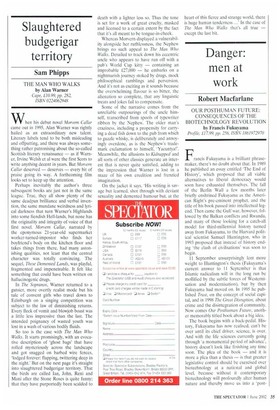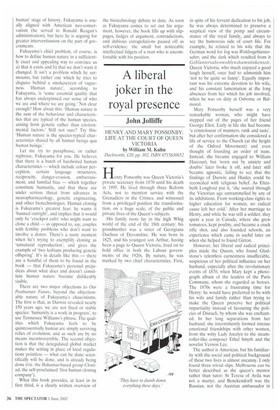Danger: men at work
Robert Macfarlane
OUR POSTHUMAN FUTURE: CONSEQUENCES OF THE BIOTECHNOLOGY REVOLUTION by Francis Fukuyama Profile, £17.99, pp. 256, ISBN 1861972970 Francis Fukuyama is a brilliant phrasemaker, there's no doubt about that. In 1989 he published an essay entitled 'The End of History', which proposed that all viable alternatives to liberal democracy would soon have exhausted themselves. The fall of the Berlin Wall a few months later briefly enshrined Fukuyama as the American Right's pre-eminent prophet, and the title of his book passed into intellectual legend. Then came the Gulf war, however, followed by the Balkan conflicts and Rwanda, and many of those looking for a catch-all model for third-millennial history turned away from Fukuyama, to the Harvard political scientist Samuel Huntington, who in 1993 proposed that instead of history ending 'the clash of civilisations' was soon to begin.
11 September unsurprisingly lent more weight to Huntington's thesis (Fukuyama's current answer to 11 September is that Islamic radicalism will in the long run be mollified by the subtle forces of Westernisation and modernisation), but by then Fukuyama had moved on. In 1995 he published Trust, on the concept of social capital, and in 1998 The Great Disruption, about crime and the disintegration of community. Now comes Our Posthuman Future, another memorably titled book about a big idea.
The book begins with a back-pedal. History, Fukuyama has now realised, can't be over until its chief driver, science, is over. And with the life sciences currently going through 'a monumental period of advance', history doesn't look like finishing any time soon. The plea of the book — and it is more a plea than a thesis — is that greater legislative control should be exercised over biotechnology at a national and global level, because without it contemporary biotechnology will profoundly alter human nature and thereby move us into a 'post human' stage of history. Fukuyama is usually aligned with American neo-conservatism (he served in Ronald Reagan's administration), but here he is arguing for greater interventionism on the part of governments.
Fukuyama's chief problem, of course, is how to define human nature in a sufficiently exact and appealing way to convince us a) that it exists and b) that we don't want it changed. It isn't a problem which he surmounts, but rather one which he tries to disguise behind a smokescreen of vagueness. 'Human nature', according to Fukuyama. is 'some essential quality that has always underpinned our sense of who we are and where we are going.' Not clear enough? How about this: 'Human nature is the sum of the behaviour and characteristics that are typical of the human species, arising from genetic rather than environmental factors.' Still not sure? Try this: 'Human nature is the species-typical characteristics shared by all human beings qua human beings.'
Let me try to paraphrase, or rather rephrase, Fukuyama for you. He believes that there is a batch of hardwired human characteristics — which include colour perception, certain language structures, reciprocity, danger-evasion, embarrassment, and familial bias — which together constitute humanity, and that these are under serious threat from advances in neuropharmacology, genetic engineering, and other biotechnologies. Human cloning is Fukuyama's greatest fear: he wants it 'banned outright', and implies that it would only be 'crackpot cults who might want to clone a child — as opposed to, say, couples with fertility problems who don't want to involve a donor. There's a nasty moment when he's trying to exemplify cloning as 'unnatural reproduction', and gives the example of 'two lesbians producing genetic offspring'. It's in details like this — there are a handful of them to be found in the book — that Fukuyama's personal prejudices about what does and doesn't constitute human nature become dislikeably visible.
There are two major objections to Our Posthuman Future, beyond the objectionable nature of Fukuyama's chauvinisms. The first is that, as Darwin revealed nearly 150 years ago, we are not fixed or stable species: 'humanity is a work in progress', to use Tennessee Williams's phrase. The qualities which Fukuyama feels to be quintessentially human are simply surviving relics of evolution, and as such are by no means incontrovertible. The second objection is that the deregulated global market makes the setting in place of local regulations pointless — what can be done scientifically will be done, and is already being done (viz. the Bahamas-based group Cloniad, the self-proclaimed 'first human cloning company).
What this book provides, at least in its first third, is a clearly written overview of the biotechnology debate to date. As soon as Fukuyama comes to set out his argument, however, the book fills up with slippages, fudges of argument, contradictions, and dubious extrapolations passed off as self-evidence: the small but noticeable intellectual fidgets of a man who is uncomfortable with his position.







































































 Previous page
Previous page